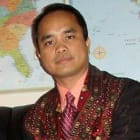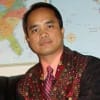commentary Commentary
Commentary: Why Myanmar voted overwhelmingly for Aung San Suu Kyi again
Amid the country’s fragile democratisation process, fight with COVID-19 and Rohingya crisis, Myanmar voters know Aung San Suu Kyi’s National League for Democracy is their best bet, says Nehginpao Kipgen.
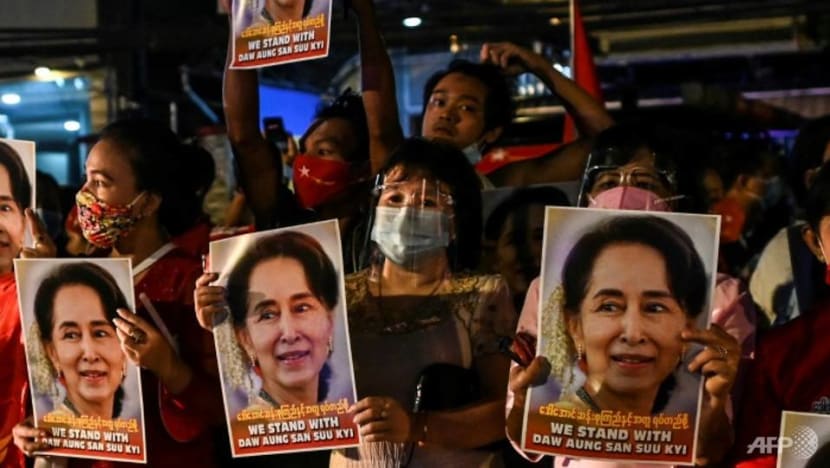
Supporters of Myanmar's National League for Democracy (NLD) hold posters with the image of Nobel laureate Aung San Suu Kyi, the country's civilian leader, as they celebrate what they say is a landslide victory in elections. (Photo: AFP/Ye Aung Thu)
NEW DEHLI: As expected, Aung San Suu Kyi’s National League for Democracy (NLD) performed well in the recently-held general election on Nov 8.
The election outcome has shown the faith and trust people have in Aung San Suu Kyi and her NLD party, irrespective of international public opinion.
How the NLD has managed to retain such strong support since their landslide victory in the 2015 polls has been a mystery to many.
Yet, a careful assessment suggests three major issues propelled domestic support – the Rohingya issue, the military, and the COVID-19 pandemic.
READ: Commentary: So much hope as Myanmar head to polls
READ: Commentary: Myanmar’s 2020 elections a major test for Aung San Suu Kyi
HOW THE ROHINGYA CRISIS SOLIDIFIED SUPPORT
The Rohinya crisis, which saw almost a million Rohingya refugees forced out of Myanmar into camps in Cox’s Bazaar, has been a double-edged sword for Aung Sun Suu Kyi.
Once an international icon of democracy and human rights after being placed under house arrest by the military for decades, as leader of her country, she chose not to bow to international opinion calling for an inquisition amid concerns of ethnic cleansing.
Instead, she decided to take the heat off the country last December, by leading a delegation to answer genocidal accusations at the United Nations’ highest court in The Hague.
READ: Commentary: Proving Myanmar had genocidal intent is not straightforward
While this brave move won her greater support among loyal supporters within the country, international observers, however, were concerned her exculpation of what seemed like the indefensible actions of the military, made her look like a stooge of the country’s defence establishment and stymied global efforts to find a resolution to a crisis of international proportions.
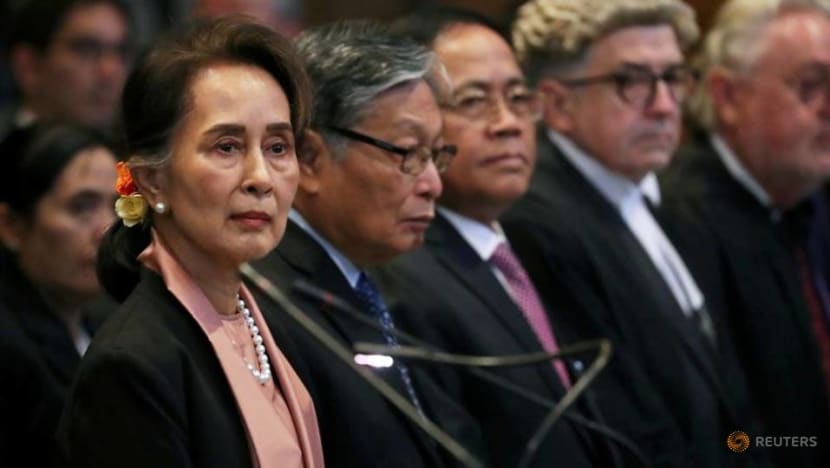
This did not stop Aung San Suu Kyi from vociferously defending military clearance operations as a necessary response to the Arakan Rohingya Salvation Army (ARSA)’s attacks on security posts across Rakhine state.
The NLD government not only labelled the ARSA a terrorist group but accused the international community of ignorance and interference.
Aung San Suu Kyi has solidified her position as Myanmar’s ultimate defender on the world stage. Time and time again, she rose to the occasion to protect her country against a tide of global criticism, efforts which won support for her and the NLD government within Myanmar.
Demonstrations supporting Aung San Suu Kyi took place in the streets as thousands wanted to show support before she left for the International Court of Justice, with just as many lining up to welcome her home after.
The fact remains that most of Myanmar, with an overwhelming majority of the Bama/Burman ethnic group that forms almost two-thirds of the country’s population, holds the view that the Rohingya are illegal immigrants who should not be given citizenship.
READ: Commentary: Old wounds, fresh denial in Myanmar over the Rohingya
READ: Timeline: Three years on, a look at the Rohingya crisis
SUPPORT FROM THE MILITARY
A key source of tension Aung San Suu Kyi has to manage in governing Myanmar is the relationship with the military.
Though the military and the NLD government share largely the same view on the Rohingya issue, both sides hold two diametrically opposing views on the country’s democratisation process.
Myanmar’s democratic transition is a transition-through-transaction whereby military leaders, who hold a quarter of seats in Myanmar’s legislative by default, and democratically elected parties have to reach an agreement on most policy issues.
Such a hybrid regime arrangement may seem puzzling to outsiders, but it is a system the country has come to accept in having the military actively participate in the country’s democratic process and allowing it leeway to hold onto some level of power in exchange for a smooth transition.
The people of Myanmar have swallowed bitter medicine and lived for five decades under military rule, keeping in check their ultimate desire to move toward a full democracy free of military interference.
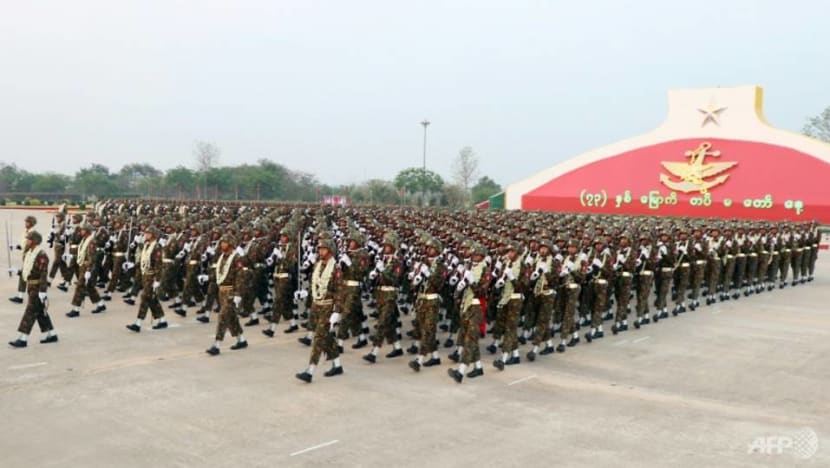
They understand the journey may have to be a long-drawn one if bloodshed is to be avoided. Voters are hopeful and optimistic that Aung San Suu Kyi and the NLD can take the country forward to their envisioned democracy.
Despite the emergence of many political parties, voters believe the NLD is the only party that can eventually stand up against the military establishment, where senior leaders of the party, including Aung San Suu Kyi, spent years in some form of detention during Myanmar’s military rule.
The Myanmar population understands its democratic transition is fragile. They were reminded of this when military commander-in-chief Senior General Min Aung Hlaing issued a statement on Nov 2 condemning the Union Election Commission and the NLD government over the handling of the election and subsequently suggested in a media interview that he might not accept the outcome of the vote.
READ: Commentary: Can Aung San Suu Kyi’s NLD win again despite not delivering many of its promises?
READ: Commentary: Lecturing Aung San Suu Kyi on press freedom wasn’t Pence’s best moment
Such an assertion from the military chief alarmed many voters of the possibility of a military comeback. Moreover, an absconding hardline monk, Wirathu, emerged from hiding that same day to galvanise nationalist support for the military-backed Union Solidarity and Development Party (USDP).
Most voters do not want to see a resurgence of the military in Myanmar’s democratic transition and know Aung San Suu Kyi’s NLD is their best bet in managing that process.
COVID-19 PANDEMIC
The COVID-19 pandemic brought the need for a strong and stable government into sharper focus and worked to the NLD government’s advantage, as voters became increasingly concerned about livelihoods and lives.
The travel restrictions and lockdowns across the country, especially in the wake of the second wave, weeks before the election, may have also limited campaigning efforts by other parties, while the NLD government was able to use all available resources and channels to reach to voters – from the country’s mainstream print media to television and radio programmes.
READ: Commentary: Has Myanmar been in denial over COVID-19 outbreak all this while?
READ: Commentary: What does it matter if Canada strips Aung San Suu Kyi of her honorary citizenship?
Campaigns were restricted across the country, owing to COVID-19 restrictions, which limited the ability of many small, new political parties to make inroads with voters.
Aung San Suu Kyi’s active use of Facebook also helped her to speak directly to voters. She took to social media regularly to remind citizens about the government’s commitments and announce new initiatives in addressing the pandemic.
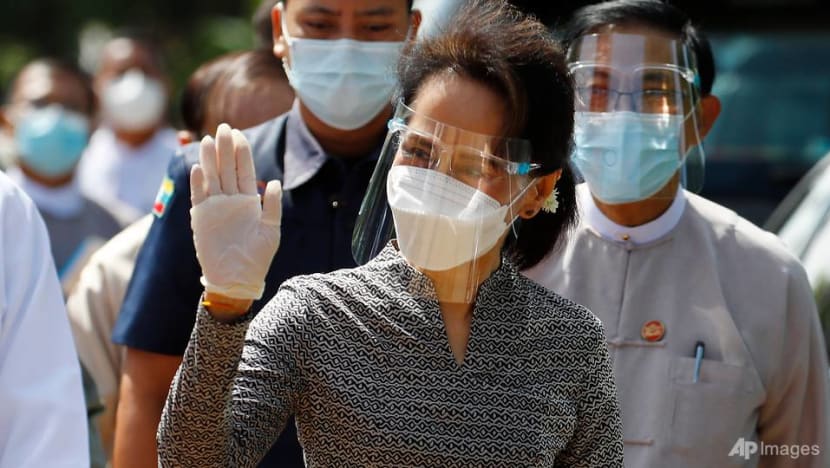
Lockdowns in areas of the country, including Rakhine state, may have also worked to the NLD’s advantage, where the overall message of security played to the incumbent government’s advantage.
All in all, this election, which entrenches the NLD’s position in government, demonstrates voters want the NLD to stay on.
Despite concerns Myanmarese voters have over the peace process with ethnic armed groups and the state of the economy, voters seem to have made an implicit pact with Aung San Suu Kyi’s NLD: They would continue voting for her and her party if she can slowly but surely bring the country forward.
The take-away, however, that despite their win, the NLD may not be able to usher in significant political change as long as the military wields considerable influence on Myanmar’s politics, is a sobering one.
Dr Nehginpao Kipgen is a Political Scientist, Associate Professor, Assistant Dean and Executive Director at the Center for Southeast Asian Studies, Jindal School of International Affairs, O.P. Jindal Global University. He is also the author of three books on Myanmar.








